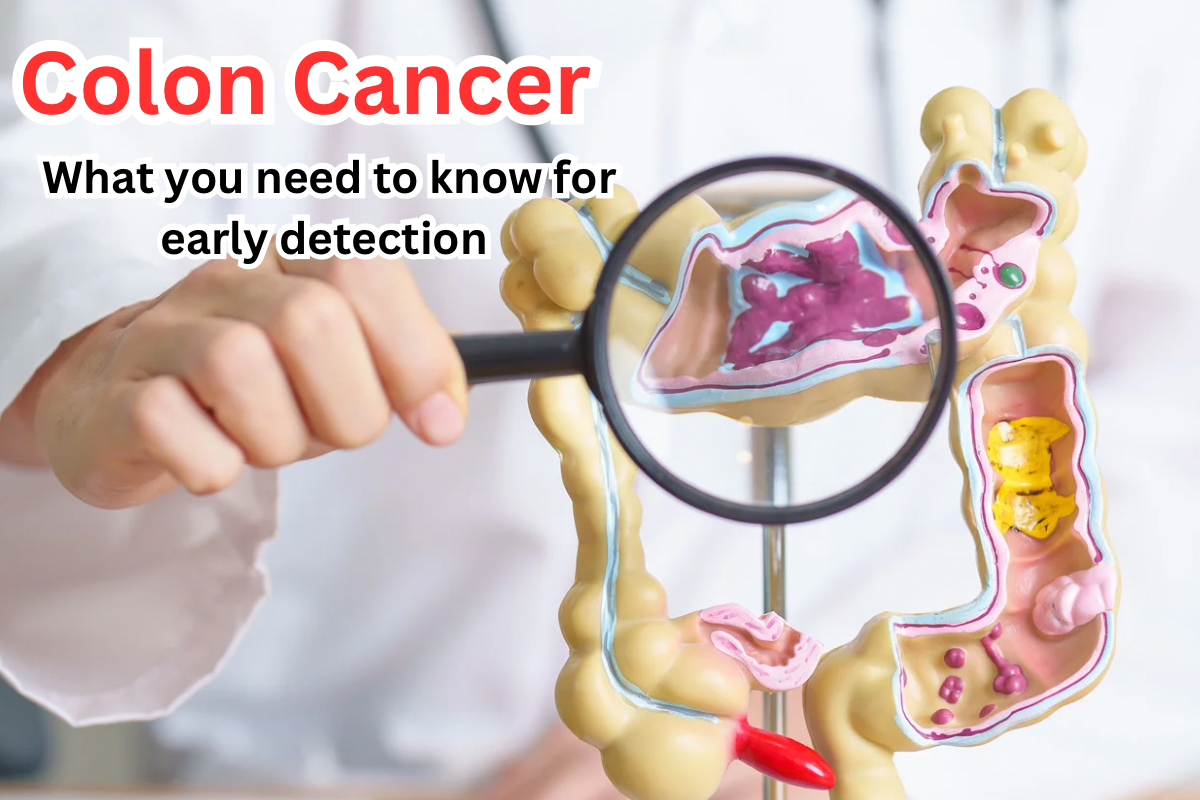Colon Cancer: What You Need to Know for Early Detection
Early detection is crucial in the fight against colon cancer. Colon Cancer: What You Need to Know for Early Detection
Understanding the risks and taking proactive steps can significantly improve treatment outcomes.
As we explore the importance of early detection, we’ll cover the essential information you need to know to protect your health.

Colon cancer, when detected early, is highly treatable.
This article will guide you through the key aspects of early detection, including risk factors, screening methods, and the benefits of catching the disease in its initial stages.
Key Takeaways – Colon Cancer: What You Need to Know for Early Detection
- Regular screenings can significantly improve treatment outcomes.
- Early detection methods include various screening tests.
- Awareness of family history plays a vital role in assessing risk.
Understanding Colon Cancer and Its Impact
Colon cancer, also known as colorectal cancer, is a type of cancer that originates in the colon or rectum. It typically starts as small, non-cancerous polyps that grow on the inner lining of the colon or rectum, and over time, some of these polyps can become cancerous.
What Happens in Colon Cancer
In colon cancer, the cancerous cells can invade the wall of the colon or rectum and spread to nearby lymph nodes or other parts of the body.
Colon Cancer Statistics in India
Colon cancer is a growing concern in India, with rising incidence rates reported in recent years. According to recent statistics, colon cancer is among the top 10 most common cancers in India, emphasizing the need for awareness and preventive measures.
Some key statistics include: Colon Cancer: What You Need to Know for Early Detection
- Increasing incidence rates, particularly in urban areas
- A higher prevalence among certain age groups and populations with specific risk factors
- The importance of screening and early detection in reducing mortality rates
Recognizing the Warning Signs of Colon Cancer
Colon cancer often begins without noticeable symptoms, but being aware of the potential warning signs can prompt individuals to seek medical attention sooner.
Common Symptoms You Shouldn’t Ignore
Some common symptoms of colon cancer include changes in bowel movements, such as diarrhea or constipation, and blood in the stool. Other symptoms can be abdominal pain or discomfort and unexplained weight loss. While these symptoms can be caused by other conditions, it’s crucial to consult a doctor if they persist.
When to See a Doctor- Colon Cancer: What You Need to Know for Early Detection
If you’re experiencing any of the common symptoms mentioned, it’s essential to schedule an appointment with your doctor.
Emergency Warning Signs
Certain symptoms require immediate medical attention. These include severe abdominal pain, vomiting blood, or passing black, tarry stools.
Being proactive about your health and recognizing the warning signs of colon cancer can be lifesaving. If you’re concerned about your symptoms or have a family history of colon cancer, consult with your healthcare provider about the best course of action.
Risk Factors and Prevention Strategies
Knowing the risk factors and adopting preventive measures can significantly reduce the incidence of colon cancer. While some risk factors are unavoidable, being aware of them can help in taking proactive steps towards prevention.
Who Is at Higher Risk – Colon Cancer: What You Need to Know for Early Detection
Certain individuals are at a higher risk of developing colon cancer. These include people with a family history of colon cancer, those with a personal history of colon polyps or inflammatory bowel disease, and individuals with certain genetic syndromes. Awareness of these risk factors is crucial for early detection.
Lifestyle Changes That Can Help
Making specific lifestyle changes can help reduce the risk of colon cancer. These include maintaining a healthy weight, being physically active, and avoiding smoking and excessive alcohol consumption. Adopting a healthy lifestyle is a significant step towards colon cancer prevention.

Dietary Recommendations for Indians
Diet plays a important role in colon cancer prevention. For Indians, incorporating a diet rich in fiber, fruits, and vegetables can be beneficial. Foods high in antioxidants and omega-3 fatty acids also contribute to a reduced risk. A balanced diet, coupled with the aforementioned lifestyle changes, can significantly impact colon cancer risk reduction.
- Increasing consumption of whole grains and legumes
- Eating a variety of colorful fruits and vegetables
- Limiting intake of processed and red meat
By understanding the risk factors and implementing these preventive strategies, individuals can significantly lower their risk of developing colon cancer.
Conclusion: Your Action Plan for Early Detection
Early detection is crucial in the fight against colon cancer. By understanding the warning signs and risk factors, you can take proactive steps towards a healthier future.
Colon cancer screening is a powerful tool that can detect the disease at an early stage, making it more treatable.
If you’re over 45, consider discussing colon cancer screening with your doctor. Lifestyle changes, such as a balanced diet rich in fiber and regular physical activity, can also play a significant role in prevention.
By being proactive about colon cancer early detection, you can significantly improve your chances of successful treatment and recovery. Make your health a priority today.
FAQ
What are the common symptoms of colon cancer?
Common symptoms include changes in bowel habits, blood in the stool, persistent abdominal discomfort, and unexplained weight loss. If you experience any of these symptoms, it’s essential to consult a doctor.
Who is at higher risk of developing colon cancer?
Individuals with a family history of colon cancer, those with a history of inflammatory bowel disease, and people over 50 years old are at a higher risk.
Lifestyle factors such as a diet high in processed meat and low in fiber, lack of physical activity, and smoking also increase the risk.
How can I reduce my risk of colon cancer?
You can reduce your risk by maintaining a healthy diet rich in fruits, vegetables, and whole grains, exercising regularly, not smoking, and limiting your alcohol intake.
Regular screenings are also crucial for early detection and prevention.
What dietary changes can help prevent colon cancer?
For Indians, incorporating more fiber-rich foods like whole grains, lentils, and vegetables into your diet can help.
Reducing the intake of processed and red meat is also beneficial.
A diet rich in antioxidants, found in foods like tomatoes and leafy greens, can also contribute to colon cancer prevention.
At what age should I start getting screened for colon cancer?
Generally, adults should start regular screening for colon cancer at the age of 50. However, if you have a family history or other risk factors, your doctor may recommend starting screenings earlier.
What are the available screening tests for colon cancer?
Common screening tests include the fecal occult blood test (FOBT), colonoscopy, CT colonography, and flexible sigmoidoscopy. Your doctor can help determine the most appropriate test based on your risk factors and medical history.

Dr. Shabbir Hussain Bohra (Physio)
Owner & Founder – Physio Talk
Director – HAKIMI Physiotherapy Clinic, Nagpur
Dr. Shabbir Hussain Bohra is a dedicated physiotherapist with seven years of comprehensive experience in rehabilitation and specialized therapeutic care. He holds a Bachelor of Physiotherapy (BPT) degree and has established himself as a leading expert in oncology physiotherapy and lymphedema management. Currently serving as a Consultant Physiotherapist at Asian Kidney Hospital, Nagpur, director hakimi Physiotherapy clinic nagpur Dr. Bohra brings extensive expertise in treating complex medical conditions requiring specialized rehabilitation approaches. His dual specialization as an Onco-Physiotherapist and Lymphedema Therapist enables him to provide targeted care for cancer patients and individuals managing lymphatic disorders.
